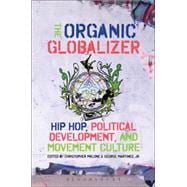The Organic Globalizer is a collection of critical essays which takes the position that hip-hop holds political significance through an understanding of its ability to at once raise cultural awareness, expand civil society's focus on social and economic justice through institution building, and engage in political activism and participation. Collectively, the essays assert hip hop's importance as an "organic globalizer:" no matter its pervasiveness or reach around the world, hip-hop ultimately remains a grassroots phenomenon that is born of the community from which it permeates. Hip hop, then, holds promise through three separate but related avenues: (1) through cultural awareness and identification/recognition of voices of marginalized communities through music and art; (2) through social creation and the institutionalization of independent alternative institutions and non-profit organizations in civil society geared toward social and economic justice; and (3) through political activism and participation in which demands are articulated and made on the state.
With editorial bridges between chapters and an emphasis on interdisciplinary and diverse perspectives, The Organic Globalizer is the natural scholarly evolution in the conversation about hip-hop and politics.






